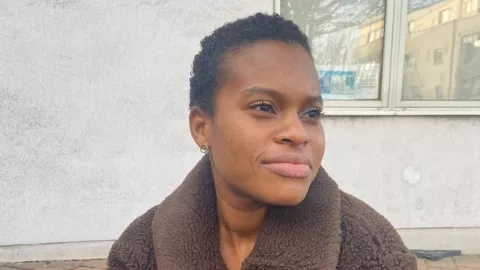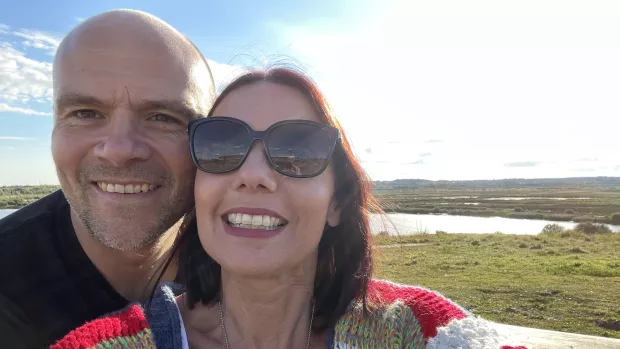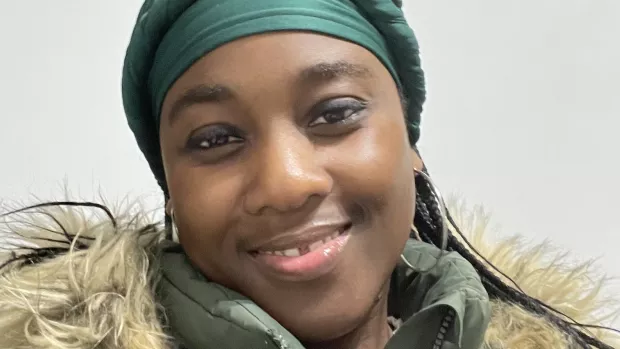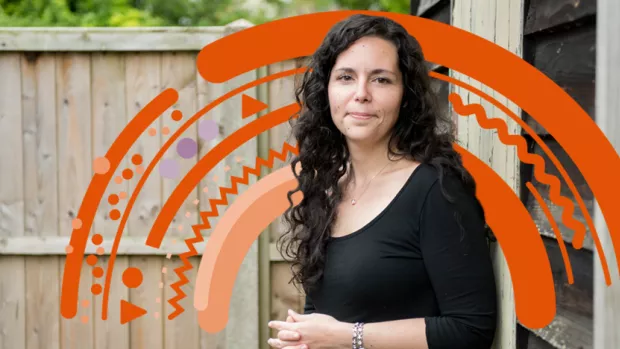
My journey to HSCT on the NHS
My name is Shereena, I live with my husband in Kent. I’m a self-confessed plant mum, and a lover of good food and a lovely scented candle.
I was diagnosed with MS in 2009. It came after a bizarre experience where I had double vision. I was 17, at college and had no idea what MS was. My neurologist told me it was a very mild form of relapsing remitting MS and not to worry. He offered me details of a local MS nurse and told me if it got worse we’d deal with it then.
I had no relapses or progression for 5 years, I wasn’t on a disease modifying therapy (DMT) and I lived a normal teenage life.
I started getting frequent relapses
After that 5 year period, I had relapses a year apart until 2017. Spasticity would erupt in my hands, arms and legs and cause me to fall to the floor. My body contorted by stiffness and pain, I would cry and scream not knowing what was going on.
My first neurologist shrugged off every relapse I had. I didn’t think anything of it because “the doctor knows best”. Little did I know I needed to advocate for myself! When I was diagnosed, I was a child and I wasn’t taking things seriously.
A battle to be heard
As an adult, I have never felt heard by my neurologist. Every time I've had a concern I've felt a battle. I often finished talks with my MS team feeling frustrated and more of a patient than a person. Each person with MS is individual and has different levels of knowledge and understanding.
Four MRIs later, countless therapies, a change of neurologist and hospital (and having done some research of my own)
I was diagnosed with highly active relapsing-remitting MS. Now I can’t stand or walk unaided and have symptoms like bladder problems, double vision and temperature sensitivity.
Finding the right treatment
I wasn’t on any DMT until 2019 - 10 years after diagnosis. I then tried two different DMTs but my symptoms continued to surface and my mobility got worse.
Ocrevus (ocrelizumab) or Lemtrada (alemtuzumab) or HSCT (haematopoietic stem cell transplantation) were my next options. I'd previously researched HSCT and asked about it - but there’s a narrow criteria I had to meet before I could even be considered.
A neurologist explained to me that Ocrevus was about as effective as Tysabri (natalizumab) (which I’d tried) and Lemtrada felt to me just as risky as HSCT so I thought, “why not go for it?”
Getting information about HSCT
I never had a proper conversation with my local neurologist about what HSCT could mean for me. My MS nurses said nothing and I navigated this journey alone.
Immediately after making my decision to try HSCT my neurologist referred me to King’s College Hospital in London. I was seen by another neurologist there during the peak of the pandemic. He went through each DMT and finally HSCT. I had already made my mind up - the MS I was dealing with was aggressive and time seemed to be speeding.
As I’d already researched the procedure, I knew it would be tough. Speaking with a haematologist who was a stem cell transplant specialist really solidified it further. He explained the transplant step by step and I felt I had all the information I needed.
I’ll be having HSCT at King’s College Hospital under the NHS. So far I’ve had loads of tests, had some chemotherapy and other drugs, and had the stem cells collected and stored. I’ve been shielding to protect me from infections. I’ve been told the next stages of the procedure will be delayed because the hospital has large backlogs and is undergoing construction works.
Freezing my eggs
At this point in my life and MS journey my only concern about the treatment was, and is, having children.
Reading about HSCT and the need for chemotherapy it got serious. I could be infertile at 30! Or even go through early menopause.
When I had the chance I wanted to know everything about freezing my eggs. I searched it on the web and King’s put me in contact with the fertility clinic straight away.
My view of the risks
I really didn’t have concern or fear for any other part of the procedure. The way I saw it was MS had thrown its worst at me and I’m still standing. There’s a chance of serious infection which stood out but I made it my mission to understand everything.
I’ll be under the care of a doctor who has done the largest number of transplants in the UK for autoimmune diseases, which is reassuring.
My hopes and worries for HSCT
Life is full of hazards and the peace of mind that just having a meal with friends or family won’t cause upset and discomfort would be priceless.
My desire is to walk unaided again, I want to run with my children and take long walks with my husband. I would like to enjoy a sense of independence that I don’t have now.
But I worry that my body has experienced too much damage to be rectified. And also that I could be in hospital longer than I hope to be.
I can’t wait to get the second stage started so I can work hard at building my life back.




